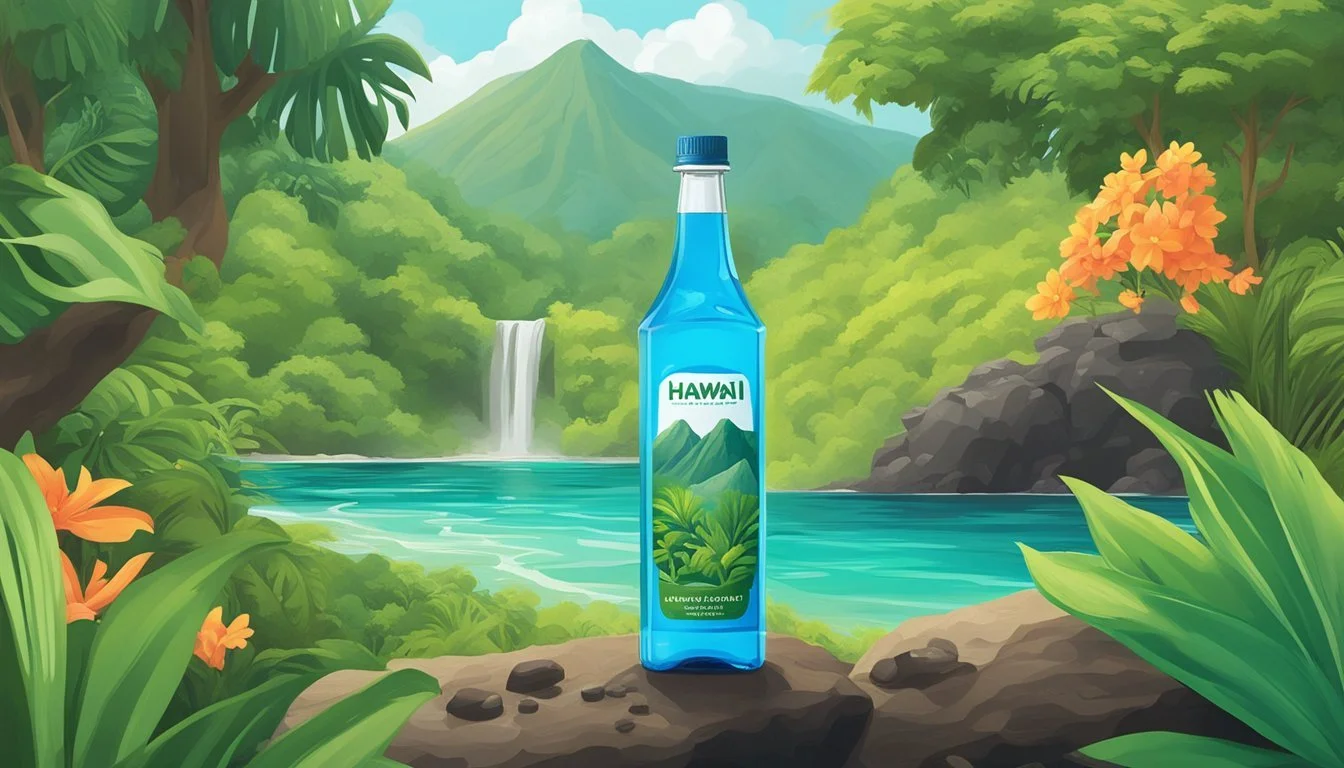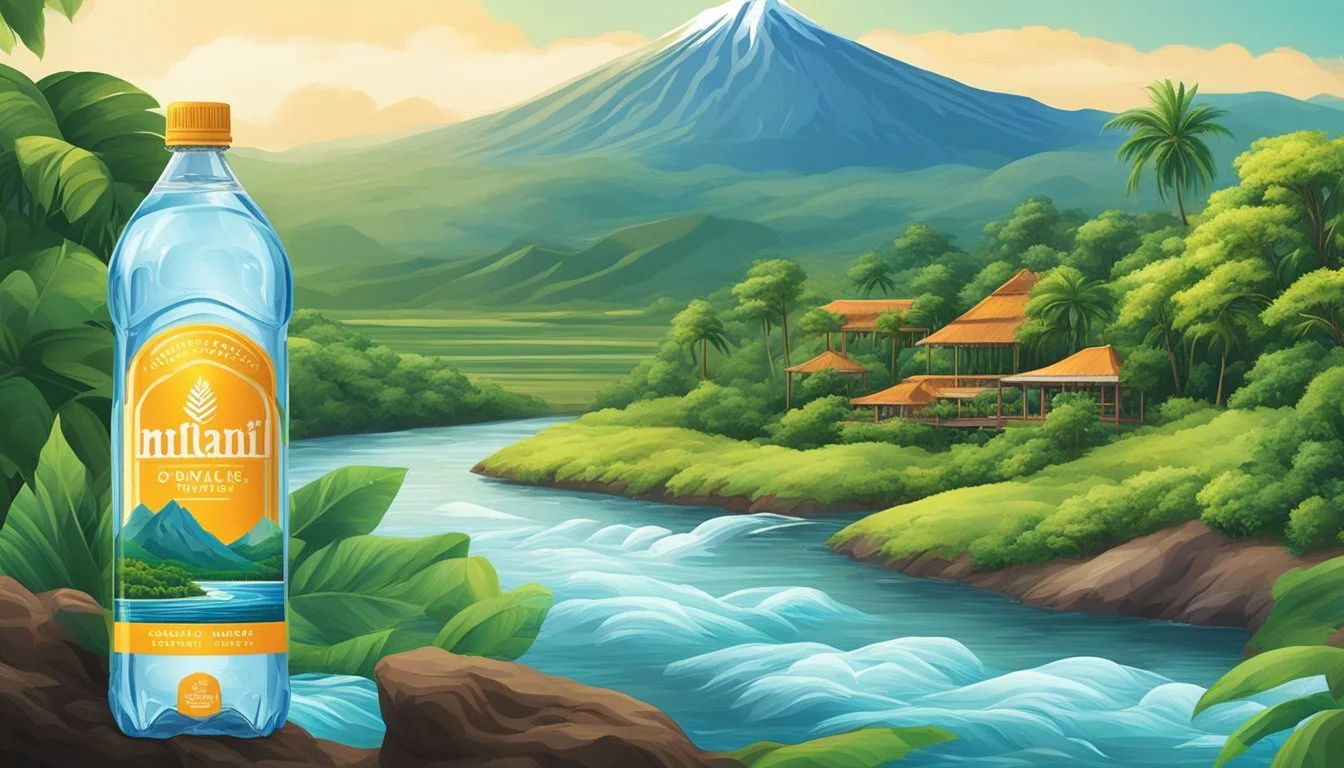Hawai’i Volcanic vs. Flow
Which Bottled Water is Better?
Choosing the right bottled water brand can be a daunting task, especially with myriad options claiming various benefits. Hawai’i Volcanic and Flow are two formidable contenders in the market, known for their unique sourcing and health benefits. Hawai’i Volcanic water stands out with its naturally high alkaline pH of 8.8, which supports the body's critical functions and neutralizes acidity. This water is sourced from a deep well at the Mauna Loa volcano, ensuring purity and environmental sustainability.
Flow, on the other hand, offers a smooth, mineral-rich taste derived from its artesian spring sources. It boasts a balanced pH of around 8.1 and contains naturally occurring electrolytes and essential minerals. The packaging is eco-friendly, aligning with growing consumer demands for sustainable practices.
By comparing the distinctive qualities of Hawai’i Volcanic and Flow, consumers can better understand which water meets their hydration and health needs more effectively. Both brands provide excellent options, but a thorough examination of their benefits and sourcing practices will reveal the superior choice for your lifestyle.
Exploring The Origins
Hawai’i Volcanic and Flow bottled waters have unique origins that play a crucial role in their distinct characteristics. Understanding these origins helps in appreciating their quality and benefits.
The Majestic Mauna Loa
Mauna Loa, an active volcano on the Big Island of Hawaii, significantly contributes to the origins of Hawai’ian volcanic water. This volcano, one of the largest and most active on Earth, has a unique role in filtering water.
Rainfall and snowmelt on Mauna Loa percolate through its porous lava rock. This natural filtration process enriches the water with minerals and electrolytes. As a result, the water sourced from Mauna Loa is often considered among the purest environments available. This volcanic activity ensures that the water has a distinct taste and quality, valued worldwide.
Hawaiian Volcano Water Cycle
The Hawaiian volcanic water cycle is integral to the origin of Hawai’i Volcanic water. Water from rainfall and snowmelt permeates volcanic rock, undergoing natural filtration. This cycle is facilitated by the volcanic structure of the Big Island, particularly around Hilo.
During its journey through the porous lava rock, the water becomes enriched with natural alkaline properties and essential minerals. This process not only provides a unique taste but also contributes to the water’s health-enhancing qualities. The sustainable sourcing from Hawai’i’s volcanic aquifers ensures a steady supply of high-quality water, prized for its purity and mineral content.
Health and Hydration
Hawai’i Volcanic and Flow water are both reputed for their potential health benefits through nutrient-rich compositions and their roles in maintaining hydration, particularly for active lifestyles.
Nutrient-Rich Composition
Hawai’i Volcanic boasts a composition rich in minerals. As the water travels through volcanic rock, it absorbs essential elements like silica, which is linked to improved collagen synthesis, supporting bone, skin, and hair health. Electrolytes including calcium, potassium, and magnesium further enhance health by maintaining fluid balance, nerve function, and muscle performance.
Flow, meanwhile, is known for its naturally alkaline properties and similarly contains beneficial minerals. These elements contribute to overall well-being by supporting various physiological processes.
Benefits of Alkaline Water
Flow water's alkaline nature is a key selling point. With a higher pH range, alkaline water is believed to help neutralize acidity in the body, potentially aiding digestion and reducing acid reflux symptoms.
Hawai’i Volcanic also offers naturally alkaline water, which can support the body’s natural pH balance. While scientific consensus on alkaline water's health effects remains inconclusive, many consumers report subjective benefits.
Hydration for an Active Lifestyle
For athletes and active individuals, hydration is critical, and both these waters offer distinct advantages. Hawai’i Volcanic, through its mineral content including calcium, magnesium, and potassium, replenishes electrolytes lost during intense activity, thus aiding in muscle function and recovery.
Flow's naturally alkaline water provides a refreshing option for maintaining hydration, especially appealing to those engaging in strenuous exercise. The potential anti-inflammatory properties of alkaline water can be particularly beneficial for athletes focused on recovery and performance.
Both waters underscore the importance of staying hydrated with quality sources that offer added health benefits, making them excellent choices for those with active lifestyles.
Product Characteristics
This section explores key attributes of Hawai'i Volcanic and Flow bottled waters, focusing on taste, purity, mineral content, and pH levels. These characteristics are vital in determining which water is suitable for various consumer needs.
Taste and Purity
Hawai'i Volcanic water undergoes volcanic filtration, which is said to enhance its purity. This filtration process passes water through layers of porous volcanic rock, removing impurities naturally. The taste is often described as clean and crisp, attributed to its low Total Dissolved Solids (TDS) level, around 40 ppm.
Flow water, known for its smooth and silky texture, derives its purity from a natural limestone aquifer in Canada. This source contributes to its slightly sweet flavor and mineral-rich profile. Its lower TDS level indicates minimal contaminants, ensuring a high degree of purity.
Mineral Content Profiling
Hawai'i Volcanic water retains naturally occurring minerals like calcium, magnesium, and silica through its volcanic filtration process. These minerals not only contribute to its taste but also offer various health benefits. The unique mineral composition is traceable to its origin from Mauna Loa volcano, enriching the water uniquely.
Flow water contains essential minerals, notably calcium, magnesium, and potassium. Harvested from an organic limestone aquifer, the mineral content in Flow water supports hydration and replenishment. The minerals present give it a distinctive smooth taste, making it a refreshing option for daily consumption.
Comparing PH Levels
Hawai'i Volcanic water has a pH level ranging from 7.6 to 8.2, making it one of the most naturally alkaline bottled waters available. The high pH helps neutralize acidity in the body, promoting a balanced pH environment.
Flow water also boasts an alkaline pH level, typically hovering around 8.1. This alkalinity stems from its natural ionization through limestone filtration. The balanced pH levels in both waters contribute to their smooth taste and potential health benefits, such as aiding digestion and promoting hydration.
Sustainability and Ethics
Sustainable and ethical practices in bottled water companies are critical for environmental preservation and social responsibility. This section compares Hawai’i Volcanic and Flow, focusing on their efforts in environmental preservation, community support, and sustainable packaging.
Environmental Preservation Efforts
Both Hawai’i Volcanic and Flow are committed to sustainable practices that help preserve the environment.
Hawai’i Volcanic sources its water from volcanic springs in a manner that ensures the water remains sustainably sourced. Their operations emphasize conservation of the surrounding forest preserves and maintaining a balance in water withdrawal and replenishment.
Flow accesses its water from natural springs and adheres to strict sustainable yield practices, preventing over-extraction and promoting long-term environmental health. Their commitment includes reducing carbon emissions through eco-friendly production processes.
Community and Social Responsibility
Hawai’i Volcanic and Flow engage in impactful community and social initiatives.
Hawai’i Volcanic runs the Kōkua Initiative, supporting educational opportunities and providing clean water to communities in need. They also have initiatives focused on aiding regions like Malawi, Africa, through partnerships with organizations such as Pump Aid to deliver clean water projects.
Flow contributes to global social responsibility by supporting various health and wellness initiatives. Their community efforts extend to promoting active, healthy lifestyles and educational programs, often partnering with local organizations to amplify their outreach and impact.
Packaging and Production
Packaging and production methods reflect each company's commitment to sustainability.
Hawai’i Volcanic uses 100% RPET (recycled polyethylene terephthalate) for their bottles, reducing the carbon footprint and the amount of plastic waste. This choice underscores their dedication to sustainable and ethical sourcing.
Flow opts for Tetra Pak cartons, which are not only recyclable but also made with a high percentage of renewable materials. This packaging reduces their reliance on plastic and lowers carbon emissions significantly. Both companies ensure their packaging materials are sustainably sourced and their production processes aim to be environmentally friendly.
The careful attention to sustainable packaging practices by both Hawai’i Volcanic and Flow demonstrates their ongoing efforts to minimize environmental impact while providing high-quality water products.
Consumer Information
This section provides essential details on cost, accessibility, and how to connect with the brands. It offers insights into price points, where to purchase, and ways to get in touch with the companies.
Cost Analysis
Hawai’i Volcanic and Flow offer distinct pricing options. Hawai’i Volcanic's price typically ranges between $1.75 to $2.50 per bottle, depending on size and retailer. Flow's offering, often available at stores like Whole Foods Market, costs around $1.99 to $2.99 per bottle.
Both brands provide discounts on bulk purchases. Subscriptions are also available, reducing costs over time with periodic deliveries. Special offers and seasonal promotions often cater to budget-conscious consumers.
Availability and Accessibility
Hawai’i Volcanic and Flow are widely accessible but differ in their distribution networks. Hawai’i Volcanic can be found in various retail locations including Whole Foods Market and specialty health stores. Flow is similarly distributed, available in major supermarkets and organic food retailers.
Purchasing online is also an option for both brands. They offer direct sales through their websites and availability on large e-commerce platforms, ensuring broad accessibility. Both brands provide subscription options to ensure consistent availability.
Connecting with the Brand
Connecting with Hawai’i Volcanic and Flow is straightforward. Hawai’i Volcanic’s customer support can be reached via phone, email, and social media platforms like Instagram and Facebook. They also maintain an informative website with a detailed FAQ section.
Flow provides similar customer care options. They have an active social media presence on platforms such as Twitter and Instagram, fostering community engagement. Their website includes a comprehensive FAQ, and they offer customer service through phone and email for direct inquiries.
This detailed consumer information intends to assist in making an informed choice between Hawai’i Volcanic and Flow bottled water.
Comparative Analysis
When comparing Hawai’i Volcanic and Flow bottled water, three primary factors come into play: the comparison with other premium brands like Fiji, the actual drinking experience, and the market presence and perception of these brands.
Hawai’i Volcanic vs. Fiji Water
Hawai’i Volcanic and Fiji are both marketed as premium water brands, each with unique features. Hawai’i Volcanic boasts volcanic filtration, promising naturally alkaline ionized water rich in minerals. It has a pH range between 7.6 and 8.2, aligning closely with other high-end waters.
Fiji water, sourced from artesian aquifers, is known for its unique mineral profile and smooth taste. It registers a similar pH level, making both waters desirable for those seeking a balanced, alkaline beverage.
Both brands focus on quality and purity, claiming to be free from harmful contaminants and leveraging their natural filtration processes to create a refreshing, clean taste.
Drinking Experience
The drinking experience of Hawai’i Volcanic is characterized by its crisp, clean taste attributed to its volcanic filtration. The high pH level ensures it feels smooth and mildly alkaline, appealing to those looking for refreshment as well as potential health benefits.
Flow, on the other hand, offers artisanal spring water that also features an alkaline pH but stands out with eco-friendly packaging. Their refillable aluminum and BPA-free containers are a significant draw for environmentally conscious consumers.
While Hawai’i Volcanic emphasizes the natural volcanic source of the water for its unique taste profile, Flow leans heavily on its sustainability efforts, differentiating itself with packaging that significantly reduces plastic waste.
Market Presence and Perception
Hawai’i Volcanic, marketed under the Waiākea brand name, is recognized for its dedication to sustainability and environmental responsibility. The company ensures that less than 0.003% of the water yielded at its Hawaiian slopes is bottled, projecting an image of restrained, responsible use of natural resources.
Fiji Water enjoys widespread recognition globally, often perceived as a status symbol among premium water brands. Its heavy presence in upscale settings and frequent celebrity endorsements reinforce its luxurious image.
Flow competes by appealing to a younger, environmentally-conscious demographic. The brand promotes not only its water’s purity but also its packaging innovations, making it a popular choice for those prioritizing sustainability alongside quality.
Together, these elements provide a comprehensive perspective on the relative merits and market strategies of Hawai’i Volcanic, Fiji, and Flow, helping readers make informed choices based on what they value most in a bottled water brand.
More About Hawai’i Volcanic
Acqua Pana vs Hawaii Volcanic: Which Bottled Water is Better?
Antipodes vs Hawaii Volcanic: Which Bottled Water is Better?
Aqua Carpatica vs Hawaii Volcanic: Which Bottled Water is Better?
Arrowhead vs Hawaii Volcanic: Which Bottled Water is Better?
Boxed Water vs Hawaii Volcanic: Which Bottled Water is Better?
Castle Rock vs Hawaii Volcanic: Which Bottled Water is Better?
Core Hydration vs Hawaii Volcanic: Which Bottled Water is Better?
Deer Park vs Hawaii Volcanic: Which Bottled Water is Better?
Hawaii Volcanic vs 1907water: Which Bottled Water is Better?
Hawaii Volcanic vs Alkaline88: Which Bottled Water is Better?
Hawaii Volcanic vs Big Chill: Which Bottled Water is Better?
Hawaii Volcanic vs BodyArmor: Which Bottled Water is Better?
Hawaii Volcanic vs Cascade Mountain: Which Bottled Water is Better?
Hawaii Volcanic vs CBD Living: Which Bottled Water is Better?
Hawaii Volcanic vs Crystal Geyser: Which Bottled Water is Better?
Hawaii Volcanic vs Crystal Lake: Which Bottled Water is Better?
Hawaii Volcanic vs Essence pH10: Which Bottled Water is Better?
Hawaii Volcanic vs Kirkland Signature: Which Bottled Water is Better?
Hawaii Volcanic vs Liquid Death: Which Bottled Water is Better?
Hawaii Volcanic vs Open Water: Which Bottled Water is Better?
Hawaii Volcanic vs Proud Source: Which Bottled Water is Better?
Hawaii Volcanic vs Pure Life: Which Bottled Water is Better?
Hawaii Volcanic vs Purely Sedona: Which Bottled Water is Better?
Hawaii Volcanic vs Richard's Rainwater: Which Bottled Water is Better?
Hawaii Volcanic vs Simple Truth: Which Bottled Water is Better?
Hawaii Volcanic vs Talking Rain AQA: Which Bottled Water is Better?
Hawaii Volcanic vs Weird Water: Which Bottled Water is Better?
Hawaii Volcanic vs Whole Foods 365: Which Bottled Water is Better?
Hawaii Volcanic vs Whole Foods Italian Still Mineral water: Which Bottled Water is Better?
Hawaiian Springs vs Hawaii Volcanic: Which Bottled Water is Better?
Ice Mountain vs Hawaii Volcanic: Which Bottled Water is Better?
Icelandic Glacial vs Hawaii Volcanic: Which Bottled Water is Better?
Just Water vs Hawaii Volcanic: Which Bottled Water is Better?
Mountain Valley Spring Water vs Hawaii Volcanic: Which Bottled Water is Better?
Nestle Pure Life vs Hawaii Volcanic: Which Bottled Water is Better?
Poland Spring vs Hawaii Volcanic: Which Bottled Water is Better?
San Pellegrino vs Hawaii Volcanic: Which Bottled Water is Better?
Smartwater vs Hawaii Volcanic: Which Bottled Water is Better?
Solan de Cabras vs Hawaii Volcanic: Which Bottled Water is Better?
Topo Chico vs Hawaii Volcanic: Which Bottled Water is Better?
Zephyrhills vs Hawaii Volcanic: Which Bottled Water is Better?






